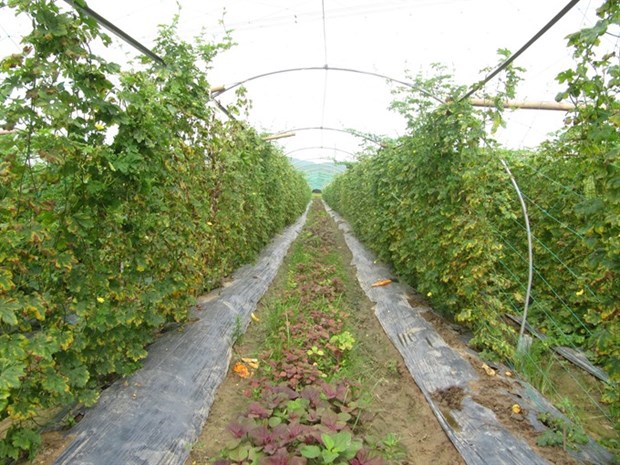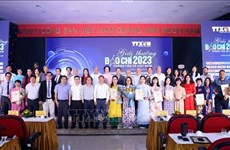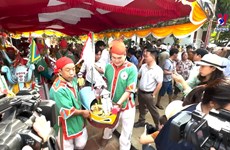Da Nang to up use of organic fertiliser
The central city of Da Nang plans to increase the use of liquid fertiliser made from organic waste in its farms and public gardens, a local official said.
 A "safe vegetables" farm in Hoa Vang District, Da Nang. (Photo: VNA)
A "safe vegetables" farm in Hoa Vang District, Da Nang. (Photo: VNA)Da Nang (VNA) - The central city of Da Nang plans to increase the use of liquid fertiliser made from organic waste in its farms and public gardens, a local official said.
Speaking at a review of a three-year (2015-2017) project on recycling organic waste last week, Nguyen Phu Thai, Director of the Da Nang Institute of Socio-Economic Development, said this would help improve urban sanitation and support farmers in the city’s suburban areas.
The pilot project, carried out in Hoa Vang district, was funded by the Japan International Cooperation Agency (JICA).
It brought in Japanese experts from Kyushu University, Saga University, Environmental Business Solution Inc and Chikujo town to help identify solutions that can be applied on a big scale to help achieve the target of Da Nang becoming a green city by 2025, he said.
The project involved 40 farmers, students and teachers at junior secondary schools, with the latter playing an important role in raising public awareness of organic waste recycle.
Hoang Thi Ngoc Hieu, an official with the city’s urban environment company, said the pilot project could recycle 70 tonnes of human waste from septic tanks in the city to produce 3.5 tonnes of liquid fertiliser each day.
“It’s very positive solution for dealing with human waste and dung from urban areas and farms. It costs around 300,000 VND (13.3 USD) to convert each cubic metres of human waste into environment friendly fertiliser.
However, the city will work with Japanese experts on adjusting the technology to ensure its smooth application on a mass scale,” she said.
She said public gardens and vegetable farms could use the organic fertiliser instead of chemical fertilisers.
Nguyen Thi Thu Hanh, a staff of Hoa Vang district’s agricultural office, said the district has been developing as an organic farm zone, providing safe vegetables and other produce for the city.
“Local farmers wish to fertilise their farm with recycled organic fertiliser as it can help improve soil quality,” Hanh said.
She said the district will build big tanks to contain liquid fertiliser near farms to facilitate organic cultivation.
The mayor of Chikujo town, Hisami Arakawa, said the town has 24 years of experience in recycling human waste into organic fertiliser.
He said the plant built by the project in Hoa Vang district is similar to the one in Chikujo, and the Japanese partners will cooperate with the city in improving fertiliser quality as well as its mass use by the local community.
The mayor also said that Chikujo had cut fertiliser costs in the town by 90 percent.
Da Nang discharges nearly 700 tonnes of waste each day, of which 74 percent is food, garden and park waste, and recycling this can produce energy and save lots of money.
The city reserves an annual fund of 7 billion VND (333,000 USD) for waste collection and treatment.
The pilot project enabled Hoa Vang district to be the first locality in Vietnam to produce the fertilizer under a cooperation deal between Da Nang and Chikujo.
Thai Van Quang, an official from the city’s agriculture and rural development department, said the project will help farmers in rural areas reduce cultivation costs.
The project, which got Japanese funding of 10 billion VND (442,477 USD), included construction of a liquid fertiliser testing facility, technical training, education on the biomass circulation system and practical training in Japan.-VNA











